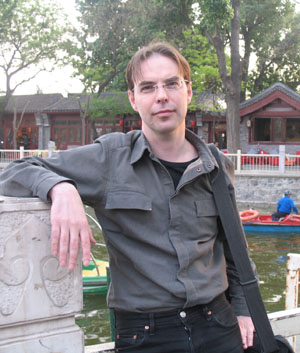"Bird's Nest" (the National Stadium), "Water Cube" (the National Aquatics Center), "Egg Shell" (the National Grand Theater), and the breathtaking new CCTV tower... more and more avant-garde buildings have been rising from the streets of Beijing in recent years. Some find them imposing, some argue about their practicality, but no matter the view, what remains indisputable is that Beijing is attracting more and more attention from the world's architects.

Andreas Luka, a German architect in his early 40s, has worked in landscape design for over 20 years. Three years ago his employer, German company Rainer Schmidt Landscape Architects of Kassel, sent him to Beijing to open a local office in support of the company's participation in several of the competitions related to landscape design for the Beijing Olympics. They were working together with other German companies on the strategic plan for Olympic Landscaping.
Luka tells how he was then introduced by his Chinese friends to Tsinghua University Urban Design Institute's Landscape Branch as a consultant. They were busy planning the Olympic Forest Park.
"It is a really a challenging task... I am very proud of being part of one of the major park projects in Beijing -- one of the most interesting parks in the world. We then got involved with other projects around the country," recalled Luka, interviewed by china.org.cn on a warm and breezy afternoon in late April.
Luka's principal responsibility in the Olympic Forest Park is the water treatment system, employing environmentally-friendly processes to keep the water in the park clean and in good quality -- something he considers to be the biggest contribution that his German counterparts have made to the Olympic Forest Park project. "My job is to assimilate the technical water cleaning system produced by other German companies into an attractive piece of landscape," said Luka, who also helped design the children's playground in the park.
"For many years now in the countries of Europe -- especially Germany -- there has been increasing attention to the importance of integrating environmental concepts into all kinds of building project, including landscape design. This is one of the major areas of expertise that we want to share with China", said Luka.
Most of the major construction work in the Olympic Forest Park has now been completed, leaving only some minor adjustment and maintenance tasks. "The Olympic Forest Park will serve not only as a facility for the Olympics", he adds. "It was created because of the Olympics, but it will become one of the biggest public parks for the people of Beijing. It is very important that local people and the occupants of nearby residential developments have enough public space, especially green space."
Having worked in many cities throughout Europe and Asia, Luka still prefers Beijing for its rapid development and the interesting changes apparent every day. He has also made a lot of friends in Beijing. After one year working with Tsinghua University Urban Design Institute Landscape Branch he joined GHD in Beijing, an Australian engineering and architecture company, which has led him to participate in further landscaping projects with other cities around China besides Beijing.
Refuting some reports that foreign architects are using China as their guinea pig, Luka said: "In all the competitions for these buildings you have to show new concepts. It makes no sense to bring old ideas to a city with such a vivid life style -- we need strong symbols to show the new spirit of the city. China is a promising land for world architects", he continued, "and projects in China are challenging because we now face more and harder competition from Chinese architects. Many projects are now based on cooperation with our Chinese counterparts, and we depend on our Chinese partners to bring these projects to life."
Luka acknowledged that he has learned a lot from Chinese culture during the past three years. "It influences my thinking and my approach -- my design is getting much more colorful than before," he said. On his Chinese counterparts, he observed: "They are very talented and able to work at a pace that is quite unusual in Europe. We often need much more time to do the same work. Our Chinese counterparts are quick and efficient, but sometimes I feel perhaps too much in rush -- occasionally it might be helpful just to slow down and think a little bit more."
Luka has visited all the major Olympic venues including Bird's Nest and Water Cube in Beijing as well as the Sailing Marina in Qingdao and the football stadium in Shenyang. "I am interested to see what other colleagues are doing. These buildings are very exciting, especially Bird's Nest and Water Cube. They are truly iconic buildings, for all that some people find them a little over the top. I consider they are worthy symbols of the Olympic Spirit and admirable landmarks for Beijing city", he said.
Luka thinks the construction of new infrastructure like subways, green belts, and venues during the build-up to the Olympics will provide a significant improvement to quality of life in Beijing. He hopes that the Beijing Olympics will not only showcase China's capability of hosting such a major event but also demonstrate its ability to realize sustainable development afterwards. His wish is that the Games can also help people from other countries better to understand Chinese culture, Chinese life, and the Chinese point of view, leading to improved understanding and relationships between China and other countries.
(China.org.cn by Wang Qian May 5, 2008)